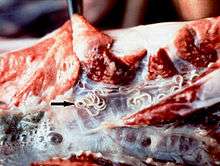Parasitic bronchitis
Parasitic bronchitis, also known as hoose, husk, or verminous bronchitis,[1] is a disease of sheep, cattle, goats,[2] and swine caused by the presence of various species of parasite, commonly known as lungworms,[3] in the bronchial tubes or in the lungs. It is marked by cough, dyspnea, anorexia and constipation. Lungworms which cause parasitic bronchitis include nematodes of the genera Dictyocaulus, Metastrongylus, and Protostrongylus.[4] Hoose is essentially an infantile disease, almost always afflicting animals under one year of age.[5]
References
- ↑ Pease, RW, Jr. (1995). "Hoose". Merriam-Webster's medical dictionary. Springfield, Mass.: Merriam-Webster Inc. p. 295. ISBN 9780877799146.
- ↑ Boden, E; Andrews, A, eds. (2015). "Parasitic bronchitis". Black's Veterinary Dictionary (22nd ed.). p. 639. ISBN 9781408181287.
- ↑ Bowsman, DD; Zajac, AM (2014). "Parasitic bronchitis and pneumonia". In Smith, BP. Large Animal Internal Medicine (5th ed.). Elsevier Health Sciences. pp. 625–628. ISBN 9780323088404.
- ↑ Flint, Charles Louis (1859). Milch Cows And Dairy Farming; Comprising The Breeds, Breeding, And Management, In Health And Disease, Of Dairy And Other Stock, The Selection Of Milch Cows, With A Full Explanation Of Guenon's Method; The Culture Of Forage Plants, And The Production Of Milk, Butter and Cheese. Boston, MA: Phillips, Sampson and Company. p. 286. ISBN 1-4086-2818-X.
- ↑ Walley, Thomas (1879). The four bovine scourges: pleuro-pneumonia, foot-and-mouth disease, cattle plague, tubercle. Oxford University. p. 23.
This article is issued from
Wikipedia.
The text is licensed under Creative Commons - Attribution - Sharealike.
Additional terms may apply for the media files.
